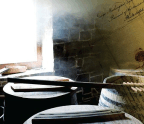THE SCIENCE OF FLAVOUR

When opening a new bottle of whisky, one focuses on the aroma and flavour of the spirit without having to worry that it might contain anything untoward. However, this was not always the case. During the 19th century, adulteration of food and drink was rife, as evidenced by the Glasgow Whisky Scandal of 1872. The editor of the North British Daily Mail obtained 30 samples of whisky from public houses in Glasgow and had them subjected to analysis. Only two were found to be genuine ‘whisky,’ while the others were either greatly diluted with water or, more worryingly, methylated spirits, turpentine, furniture polish and even sulphuric acid.
These practices occurred despite the existence of the Adulteration Act (1860) and, ultimately, such exposés led to the appointment of public analysts across Britain. In Glasgow, leading analytical chemist Robert Rattray Tatlock and his nephew, Robert Thomson, established a business as food and drink analysts in Bath Street during 1891, going on to be appointed public analysts for the city. The partners were
You’re reading a preview, subscribe to read more.
Start your free 30 days



